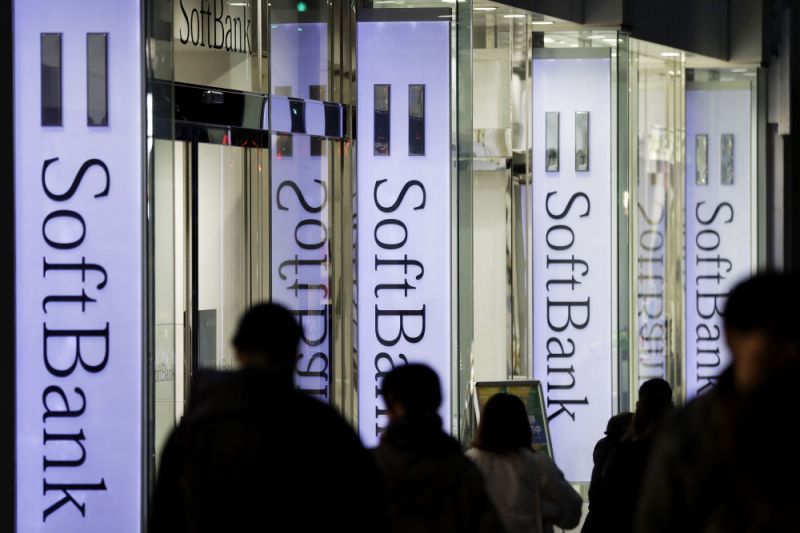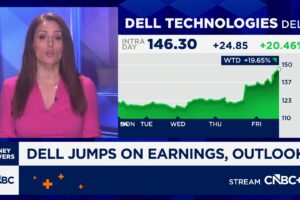(Bloomberg) — SoftBank Group Corp.’s founder Masayoshi Son unveiled a second enormous fund for technology investments, seeking to extend his reign as the most influential investor in the industry.
The Japanese conglomerate aims to raise a total of $108 billion for the second Vision Fund, which would make it even larger than the first, unprecedented $100 billion effort. SoftBank is also taking more control this time around, committing $38 billion in capital itself and replacing Saudi Arabia as the largest investor. Saudi Arabia’s Public Investment Fund, which chipped in $45 billion for the initial effort, was not mentioned in the announcement Friday.
SoftBank said the second fund is expected to collect money from Apple Inc., Microsoft Corp., Foxconn Technology Group and the sovereign wealth fund of Kazakhstan. Son also won broad support from Japanese financial institutions with seven identified as signing memorandums of understanding to participate.
Son is aiming to raise a new massive fund every two or three years to take advantage of opportunities he sees in cutting-edge technologies such as artificial intelligence and autonomous driving. SoftBank in June disclosed the initial Vision Fund has earned 62% returns so far after making 71 investments for a total of $64.2 billion.
“I wasn’t sure it would be possible to raise $100 billion without Saudi money, but it looks like it is,” said Chris Lane, an analyst with Sanford C. Bernstein & Co. “I think it was a conscious decision by Softbank to decrease the influence of the Saudis.”
Saudi Arabia and Crown Prince Mohammed bin Salman came under fire last year after the murder of journalist Jamal Khashoggi in a Saudi consulate in Istanbul. While Saudi officials have said the killing was carried out by rogue agents and have denied that the prince had any knowledge of their plan, U.S. politicians continue to press for further action in the case.
“I think Masa personally was quite horrified by what happened,” said Lane.
Saudi Arabia’s PIF and Mubadala Investment Co., both key partners in the first fund, are still in talks about possible investments, said Daisuke Sawatake, a SoftBank spokesman.
The Japanese financial firms that have signed MOUs are Mizuho Financial Group Inc., Sumitomo Mitsui Financial Group Inc., Mitsubishi UFJ Financial Group Inc., Dai-ichi Life Holdings Inc., Sumitomo Mitsui Trust Holdings Inc., Daiwa Securities Group Inc., and SMBC Nikko Securities Inc. Other contributors will include Standard Chartered Plc, an unnamed Taiwanese investor and the fund’s management, according to the release.
Satoru Kikuchi, an analyst at SMBC Nikko Securities in Tokyo, wrote in a research report that the broader group of investors and SoftBank’s greater contribution will grant the Japanese company more influence. Kikuchi also wrote that SoftBank may sell stakes in Alibaba Group Holding Ltd. and Sprint Corp. to pay for its investment in the second vehicle.
The original Vision Fund was announced in October 2016, but it took another seven months for its first major closing. Saudi Arabia was the biggest investor with its $45 billion contribution, followed by SoftBank’s $28 billion, and $15 billion from Mubadala. Investors also included Qualcomm Inc. and Sharp Corp. The Saudis’ stake allowed them to act as a constraint on Son’s power at the original fund.
After decades of building his telecom empire, the 61-year-old is spending more time on investing. He has handed over the day-to-day management of SoftBank’s domestic telecom operations, a cash-cow division that went public in December, to his long-term lieutenant Ken Miyauchi. He has also engineered the sale of his Sprint wireless business to T-Mobile US Inc., a deal that is pending regulatory approval in the U.S.
One question is whether SoftBank will be able to keep up the pace and scale of investments. The first fund targeted stakes of over $100 million, in just two years amassing a portfolio of 82 leading technology companies, including Uber Technologies Inc. and WeWork Cos. Ride-hailing is the single biggest segment, including stakes in China’s Didi Chuxing, India’s Ola and Singapore’s Grab.
According to data from market researcher CB Insights, SoftBank Group was an investor in 24 of 377 global unicorns, startups valued over $1 billion. While several of its portfolio companies — Uber and Slack Technologies Inc. — have gone public, profitable exits for many others might still be years away.
Lane has argued that investors have underestimated the potential returns from Son’s investment efforts. In an in-depth report earlier this year, he estimated the initial fund’s net present value was $14 billion to $24 billion, assuming returns of 15% to 20%. He said the net present value of the current and future funds could be $50 billion to $85 billion.
“The first round of investors were betting on a man and betting on his vision, but the idea hadn’t been tested,” Lane said in an interview. “For the second round of investors, you can see the facts, you can see the returns.”
(Updates with analyst comments from fifth paragraph.)
–With assistance from Peter Elstrom.
To contact the reporter on this story: Pavel Alpeyev in Tokyo at [email protected]
To contact the editors responsible for this story: Edwin Chan at [email protected], Peter Elstrom
<p class="canvas-atom canvas-text Mb(1.0em) Mb(0)–sm Mt(0.8em)–sm" type="text" content="For more articles like this, please visit us at bloomberg.com” data-reactid=”65″>For more articles like this, please visit us at bloomberg.com
©2019 Bloomberg L.P.











